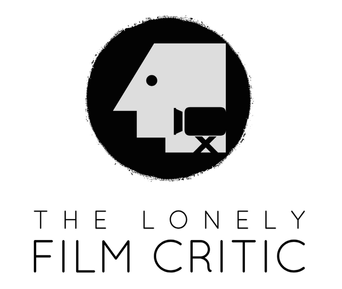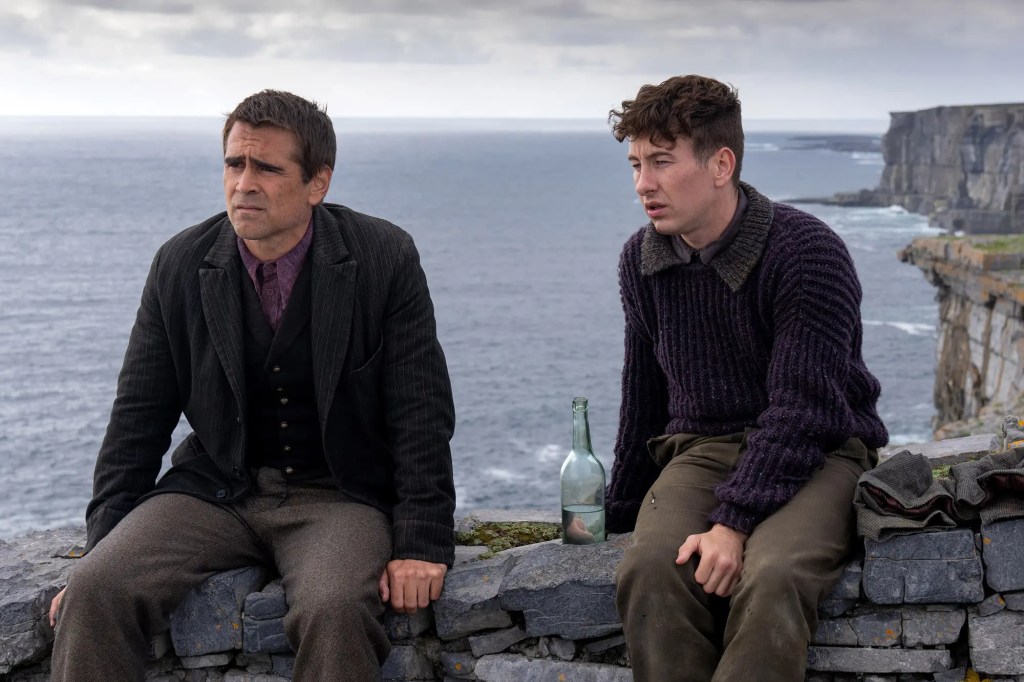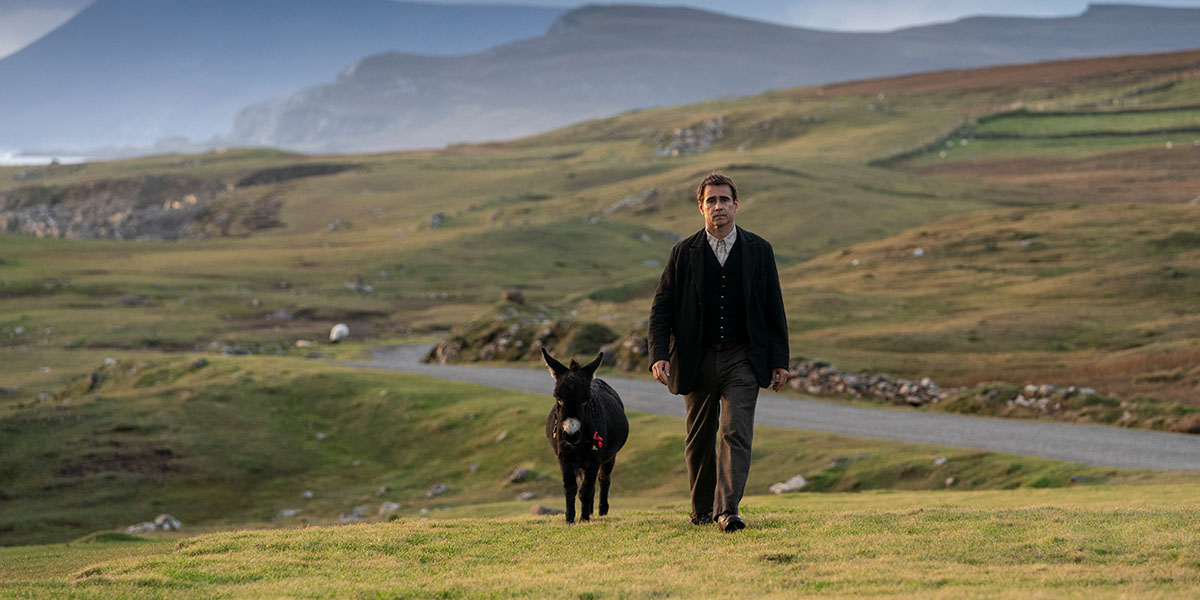
The Banshees of Inisherin (McDonagh, 2022)
After a sojourn in America, Martin McDonagh is back to his Irish storytelling roots with The Banshees of Inisherin, a quasi-fable set on a fictional island during the dying days of the Irish Civil War—the smoke and gunfire of which is seen briefly in the far-off distance. McDonagh’s interest here, however, is not so much with the brutal violence of warfare, but rather a more philosophical examination of how human conflict can escalate from the tiniest kernels. At the base of it, the story kicks off when placidly amiable Pádraic (Colin Farrell) arrives at his friend Colm’s (Brendan Gleeson) house to go off to the local pub together as they usually do in the afternoons. But instead of a warm welcome, Pádraic finds Colm sullenly smoking inside and completely ignoring him. All of a sudden, without warning, Colm has decided he no longer likes Pádraic and wants the two to break off their friendship. The incredulous Pádraic finds the whole situation baffling and begins futilely trying to both figure out Colm’s reasons and continue their friendship as things stood before. But as with any McDonagh tale, answers never come easily, and ultimatums are always lurking around the corner. And this time, the ultimatum Colm gives Pádraic is gruesome in the extreme.
McDonagh’s last film, Three Billboards Outside Ebbing, Missouri, was one powered by the rage begot by injustice and inaction. This film, by contrast, only begins to simmer angrily towards the end, aligning itself more with 2008’s In Bruges in the way it bounces its thematic proclivities off two starkly contrasted characters to slowly create the requisite tension for the plot (and, more obviously, this film also reunites Farrell and Gleeson, as well). As such, it’s McDonagh’s quietest and most inward-looking film to date, settling for the agony of sheer absurdity than primal bombast. It asks us to consider why we begin to unravel in the face of unknowability, and why we are drawn to prolonging and escalating quarrels instead of ending them immediately. McDonagh also probes questions about legacy, wondering if our altruistic actions are enough to be remembered by, or if remembrance can only be guaranteed by the output of our artistic endeavours. Whatever conclusions we arrive at are our own; this time around, McDonagh does not force the answers on us, which, in turn, makes interpreting the film a richer experience.
In this humbler, sparser mode, McDonagh’s storytelling strengths are much more apparent, as is his bitingly bleak sense of humour. While not uproarious, The Banshees of Inisherin does manage to find ways to amplify its droll wit without letting it overwhelm the nuanced discussions provoked by its undercurrents. It is an exquisitely calibrated work that helps to redeem McDonagh of the excesses that plagued some of his earlier projects, and I have little doubt that his screenplay will be considered one of 2022’s most rewarding. Though the film never goes big, in my mind, it’s all the better for it.

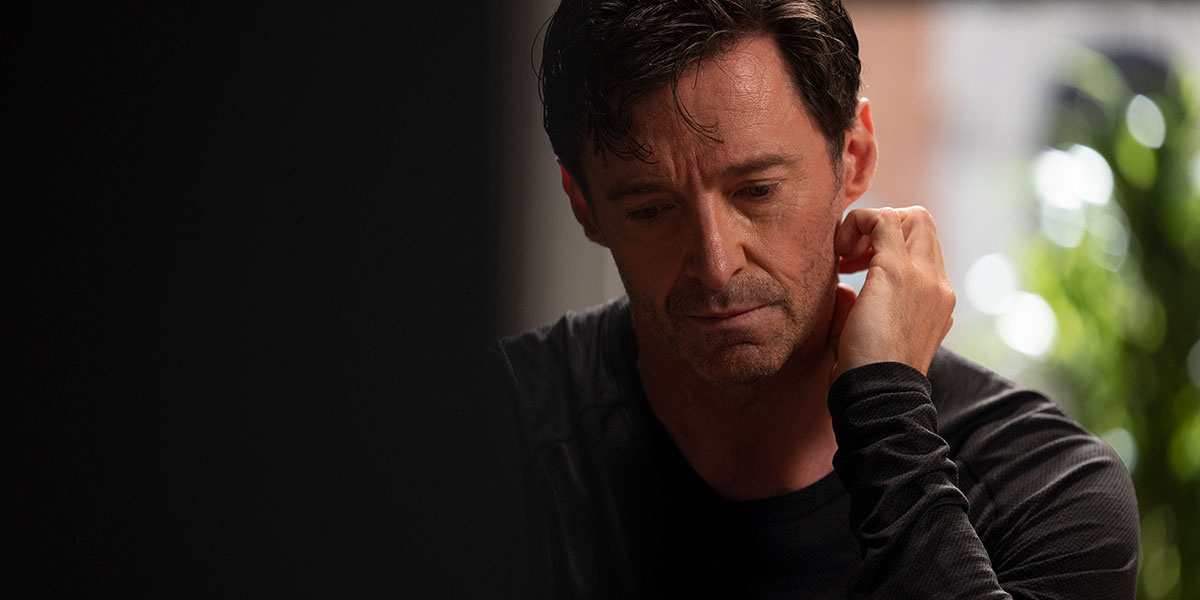
The Son (Zeller, 2022)
After successfully adapting his stage play into The Father in 2020, which netted him an Academy Award (and one for Anthony Hopkins, as well), I’m not at all surprised that Florian Zeller thought he could strike gold twice by adapting another of his works. This time, he chose The Son, which debuted in France in 2018 and deals with a father struggling to connect with his mentally ill teenaged son. And this time, I’m sad to say, he made an error of judgment, for not only is this film a rather drastic step backward for Zeller’s filmmaking career: It is also one of the worst films to be programmed at this year’s festival.
I take no pleasure in saying this, but from an artistic standpoint, The Son has no glimmer of the intelligence and ingenuity of The Father. Visually it is washed out and dreary looking, with antiseptic tones that are borderline unpleasant to stare at, and Zeller’s intermittent use of handheld camerawork for some scenes lends an amateurish air to the framing. Beyond that, its attempts to dramatize the turmoil and repercussions surrounding the titular character’s severe depression, replete with graceless symbols and half-hearted literalization, becomes almost an insult to the viewing audience’s intelligence. Indeed, the machinations of the plot to fool and disorient the audience—deployed so well in his first film, when a dementia-addled mind could be projected outward to create a labyrinth of confusions—backfire badly in this instance, particularly a twist at the end of the film meant to be intensely emotional. As figured in the film, it becomes merely a cruel affront—a cheap way to elicit unearned tears. It’s no wonder that many audience members at my screening walked out grumbling at feeling cheated, which will be a common sentiment for general moviegoers when the film is eventually released.
It could very well be the case that this play is not strong to begin with, or that it carries more potency when performed within the confines of a single stage. But it does not work on film, and no one—not Hugh Jackman, not Laura Dern, not Vanessa Kirby, and certainly not a woefully-miscast Zen McGrath—can save this from cratering. What becomes of Zeller’s future as a filmmaker I do not know, but if he does continue on behind the camera, I hope that he will test himself with material other than his own.

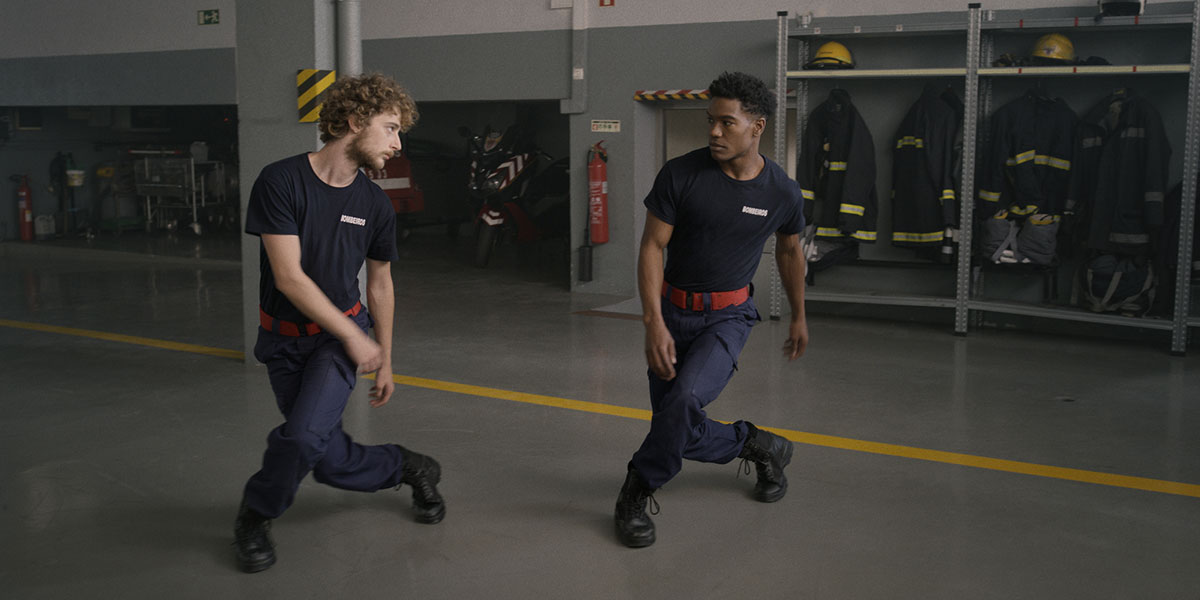
Will-o’-the-Wisp (Rodrigues, 2022)
Though largely set in a firefighting academy, João Pedro Rodrigues can be said to be stoking entirely different fires with this puckish, gay, colonial, musical romantic comedy fantasia. If these appellations weren’t enough to distinguish its singularity, one need only consider the form: It is a film barely over an hour that shifts between the distant future and the not-too-distant past (albeit an imagined one, where the Portuguese monarchy still reigns supreme); characters break the fourth wall repeatedly; and irreverent song and dance numbers interrupt the story with little rhyme or reason, other than to, perhaps, jolt the audience out of submission. Rodrigues is playing fast and loose with anything resembling conventional propriety, culminating in the portrayal of an interracial queer romance that is submerged in the fetishism and exotification of colonial oppression. To reckon with its blunt reality is uncomfortable enough, but when couched in Rodrigues’s sense of the bizarre, which oscillates in the folds of anachronism and anarchy, the unexpected levity brought about by Rodrigues’s irreverence more strikingly demarcates the true ossification of the colonial mindset. To be more precise, the formal disturbances that Rodrigues foregrounds in his cinema helps bring into sharp relief the disturbing antiquity of what cannot be remodeled in saucy self-awareness: namely, the brutality of the Atlantic slave trade and Portugal’s participation in perpetuating its illegitimacies.
Rodrigues knows he is walking a narrow tightrope here by mixing volatile history with the playful extemporization of a cinema unbound by predictable decorum. But he is also smart enough to know that damning critiques need not be realized in hectoring tones. Like both its title and the lanky and insipid title character (who can still nevertheless bust a move), Will-o’-the-Wisp rides high on the supple litheness of its unconventionality and unwillingness to stay rooted in one place. It bounces in the interstices of varying genres and critiques, undaunted by the fact that not every strike is cleanly wrought, but confident in being caustic when needed, while also giving satire—particularly satire with deeply queer sensibilities—a breath of much-needed fresh air.

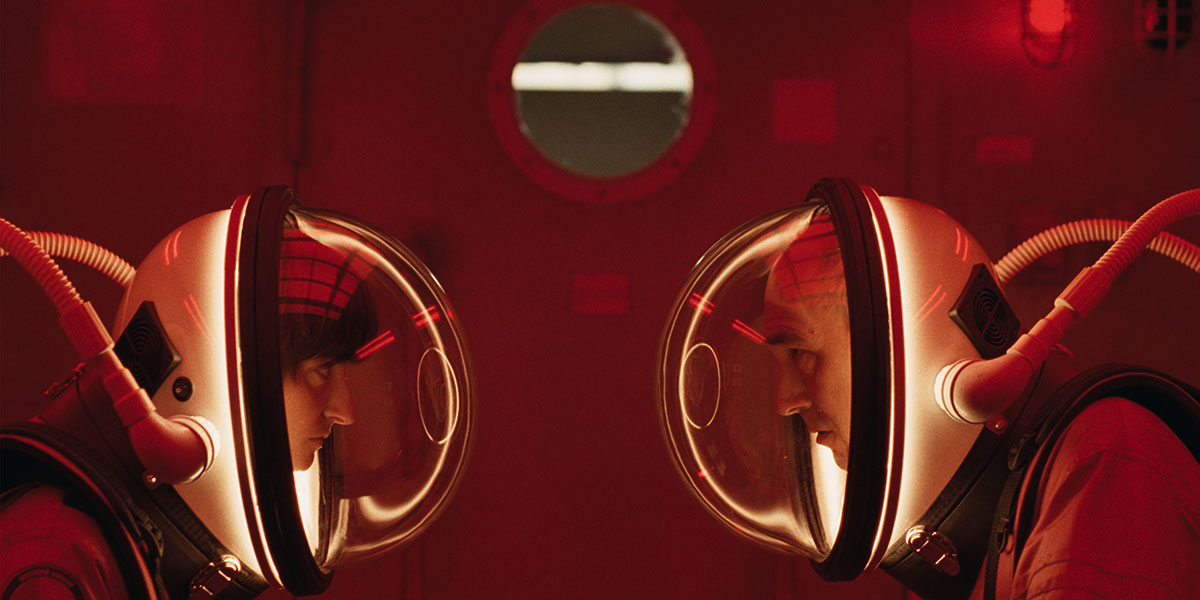
Viking (Lafleur, 2022)
Stéphane Lafleur’s Viking dreams with wide eyes and relishes in a quaint and gentle absurdism, where the toils of societal anomie are given the promise of something reparative in astronomy’s latent desire for boundless exploration. Enter an unlikely group of men and women of varying backgrounds and ages who are tasked to live in close quarters for the singular purpose of replicating the dynamics of the astronauts aboard a rocket thousands of miles away in space—a rocket bringing the first human beings to Mars. Their goal? To anticipate conflicts that might arise during the mission and find solutions that can be implemented ahead of time so that the astronauts can set foot on Mars in one piece (or, to put it even more blithely, in one peace). With each person paired to the astronaut closest to them in temperament, the experiment takes on the appearance of a more benign Stanford Prison Experiment, with everyone roleplaying identities that are not theirs for largely sociological interests.
You do not need me to tell you that, of course, this experiment does not go to plan when the precarious lines demarcating reality and personal identity begin to crumble. In that sense, Lafleur’s film—despite being stamped with his unique wryness—does feel like it’s treading familiar territory. Nor do I think that he has anything entirely new to add to the conversation when it comes to the vicissitudes of scientific experimentation on human psyches in controlled environments that become less controlled over time. But, setting that aside, he can tell a compelling yarn with characters who can be pitifully sincere to both their advantage and detriment. The actors—especially lead Steve Laplante—have a strong grasp on the material and bestow the script with their own subtle nuances that makes watching Viking quite fun, even if it’s not as original a concept as it thinks it is.

